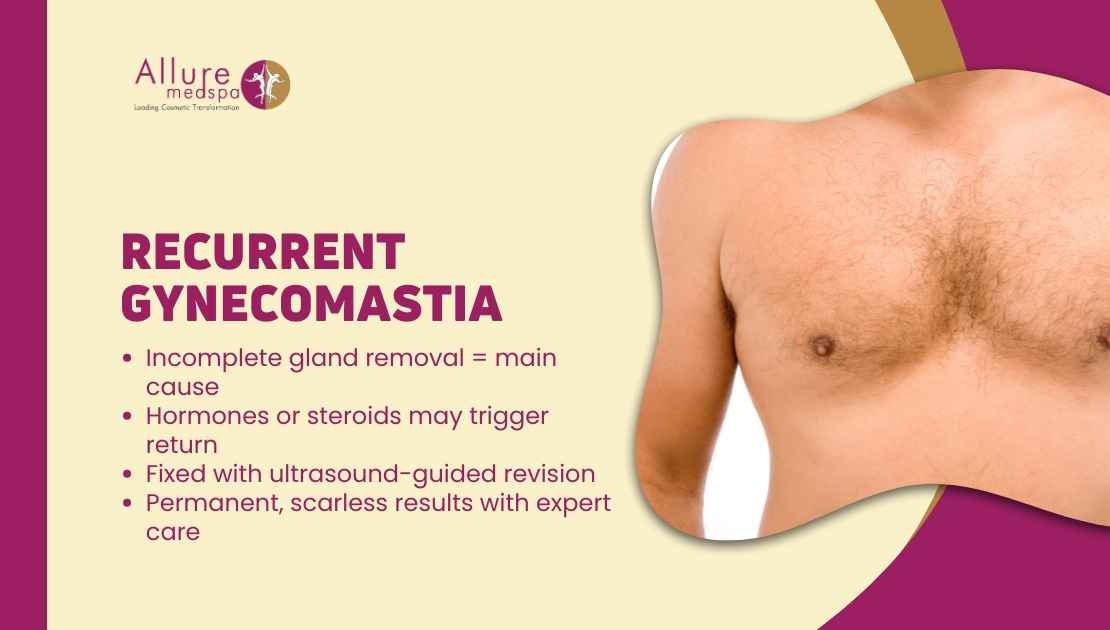Introduction
Did your male chest fullness return even after gynecomastia surgery? If you’re noticing renewed puffiness, firmness under the nipple, or emotional discomfort, you may be dealing with recurrent gynecomastia—a return of gland or fat after prior correction. While uncommon, it can be frustrating when you believed the issue was permanently resolved.
In my clinical experience, most recurrences happen due to incomplete gland removal, untreated hormonal imbalance, or lifestyle factors such as weight gain or steroid/testosterone booster use. Many patients undergo liposuction alone, which removes fat but leaves the firm gland behind—allowing the core problem to persist.
The good news is that revision gynecomastia surgery can reliably restore a flat, masculine chest. At Allure Medspa, I correct failed or relapsed cases with complete gland excision, adjunct liposuction, and scar/asymmetry refinement—aiming for long-term confidence and natural contours.
What Is Recurrent Gynecomastia?
Recurrent gynecomastia is the return of male breast enlargement after surgery, usually due to residual gland tissue or new fat gain.
-
Return of chest fullness after earlier correction
-
Most often seen when fat was removed but gland remained
-
Can involve one or both sides, with asymmetry
Common reasons of recurrent gynecomastia
-
Incomplete gland excision
-
Hormonal imbalance
-
Steroid/testosterone booster use
-
Weight gain or chest fat redistribution
-
Unsuitable technique for the original grade
Synonyms & related terms: gynecomastia recurrence, revision gynecomastia, relapsed gynecomastia, failed correction, gland not fully removed, post-surgery gland growth.
Why Does Gynecomastia Return?
It returns mainly when gland tissue is left behind, hormones aren’t addressed, or lifestyle factors reactivate chest fullness.
Key causes
-
Incomplete gland removal: Liposuction alone cannot remove firm gland
-
Hormonal imbalance: Low testosterone, endocrine or liver issues, medications
-
Steroids/supplements: Anabolic steroids, boosters, “herbal enhancers”
-
Weight gain: Chest fat can mimic recurrence even without true gland regrowth
Dr. Milan Doshi’s Tip:
Always confirm whether it’s gland, fat, or skin laxity with an exam and ultrasound before planning revision.
How Do You Know If It’s Back?
Puffy nipples, firm tissue under the areola, asymmetry, or emotional discomfort after initial relief suggest recurrence.
What patients notice
-
Puffy or swollen nipple–areola complex
-
Firm, rubbery tissue under one/both areolas
-
Uneven chest shape or distortion
-
Return of self-consciousness
Diagnosis
-
Clinical examination
-
Ultrasound to differentiate gland vs fat vs skin laxity
Can Recurrent Gynecomastia Be Corrected?
Yes—revision surgery is safe and effective when done by a specialist using complete gland excision and contouring.
What revision typically includes
-
Complete gland excision (peri-areolar incision)
-
Liposuction for smooth, masculine contours
-
Scar/asymmetry correction if needed
-
Skin tightening in select severe cases
I’ve performed 1,500+ gynecomastia surgeries, including many revision cases, with consistently high patient satisfaction.
FAQs – Recurrent Gynecomastia
Q1. How common is recurrent gynecomastia?
Ans. Rare—usually <2% when the gland is completely removed. Rates are higher with liposuction-only procedures.
Q2. Is revision surgery more difficult?
Ans. Slightly, due to scar tissue—but it’s safe and predictable in experienced hands.
Q3. Can the gland regrow after complete removal?
Ans. No. True gland does not regrow. Apparent recurrence is usually residual gland or weight-related fat.
Q4. When can revision be done after the first surgery?
Ans. Typically after 6 months, once tissues soften and settle, unless there’s an urgent reason.
Q5. How do I prevent recurrence after revision?
Ans.
-
Choose an experienced revision surgeon
-
Maintain a stable, healthy weight
-
Avoid steroids/testosterone boosters and unsupervised supplements
-
Address hormonal issues if advised
-
Follow post-op garment and activity guidance
Conclusion
Recurrent gynecomastia can be emotionally upsetting—but it does not mean failure. In most cases, it reflects an incomplete initial correction, not a permanent problem. With accurate diagnosis and expert revision surgery, a flat, masculine chest can be restored safely and permanently.
If you notice chest fullness returning, early evaluation improves outcomes. A calm, honest consultation can clarify whether you need reassurance—or precise correction by an experienced surgeon like Dr. Milan Doshi.
Confidence can always be rebuilt—with the right care.











